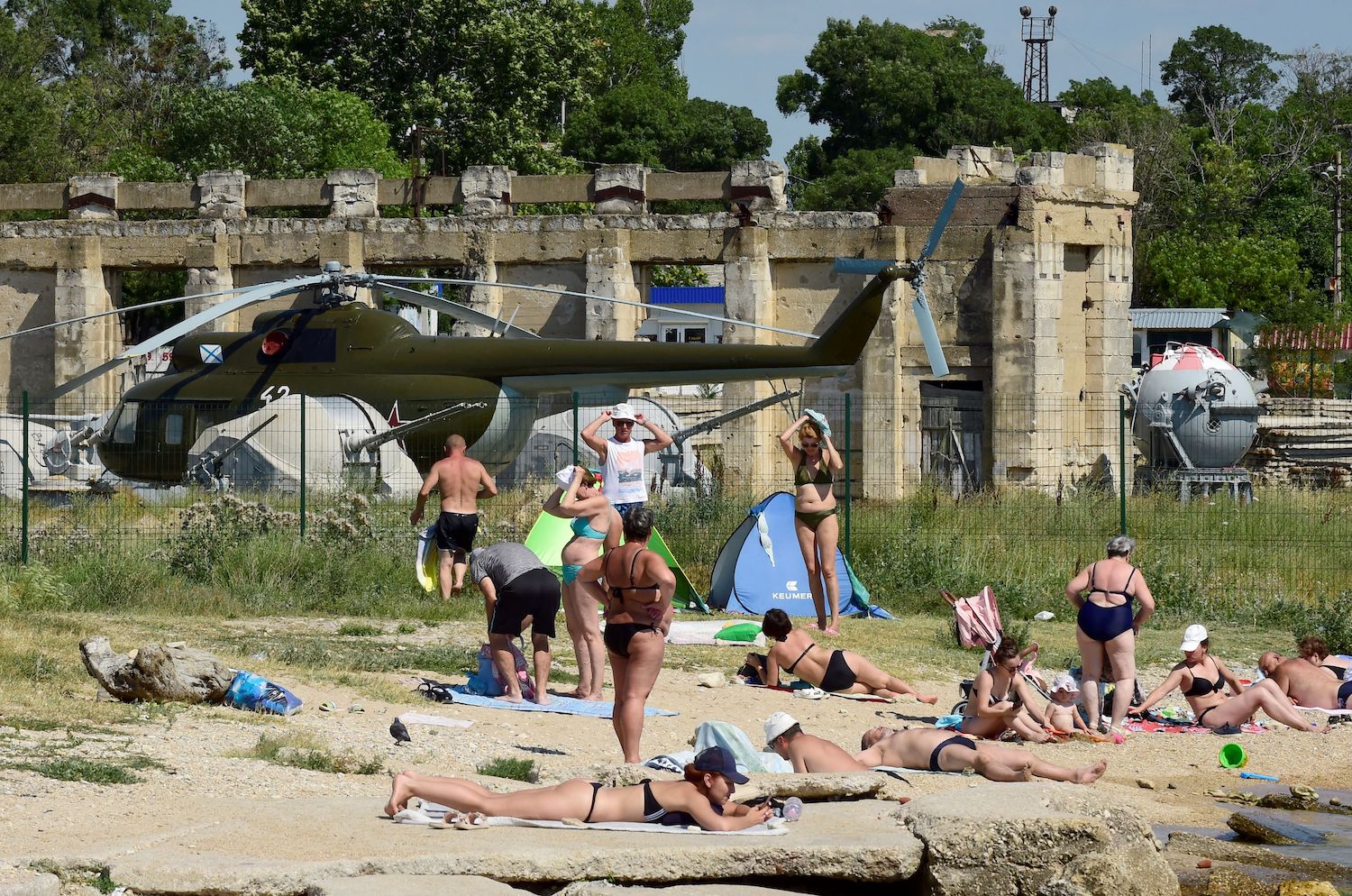Can Ukraine realistically liberate Crimea?
Volodymyr Zelenskyy says war with Russia must end with the recapture of the peninsula

A free daily email with the biggest news stories of the day – and the best features from TheWeek.com
You are now subscribed
Your newsletter sign-up was successful
Ukraine’s President Volodymyr Zelenskyy has proclaimed that the war with Russia must end with the liberation of occupied Crimea.
He was speaking after explosions rocked a Russian airbase on the Black Sea peninsula on Tuesday, killing one person and injuring others. Ukraine has not explicitly claimed responsibility for the blasts, while the Kremlin has said the cause was ammunition accidentally detonating at the base.
In the aftermath, Zelenskyy spoke at length about reclaiming Crimea, which was annexed by Russia in 2014, though is still internationally recognised as part of Ukraine.
The Week
Escape your echo chamber. Get the facts behind the news, plus analysis from multiple perspectives.

Sign up for The Week's Free Newsletters
From our morning news briefing to a weekly Good News Newsletter, get the best of The Week delivered directly to your inbox.
From our morning news briefing to a weekly Good News Newsletter, get the best of The Week delivered directly to your inbox.
Zelenskyy said in a video address that “Crimea is Ukrainian and we will never give it up”, adding that the ongoing war “began with Crimea and must end with Crimea – with its liberation.”
Earlier in July, former Russian president Dmitry Medvedev warned that “Judgment Day will come very fast and hard” to Ukraine if it attempted to attack Crimea.
What did the papers say?
Any attack by Ukraine on Russia in Crimea would be a “dramatic escalation” in the war, wrote Sammy Westfall, Dan Lamothe and Reis Thebault in The Washington Post. Since the annexation of the peninsula in 2014, the Black Sea beaches have become a haven for Russian tourists, who are “so comfortable with their security that they lounge near the base” where Tuesday’s explosions took place. If the attack was carried out by Ukraine, it would “demonstrate a remarkable ability by Ukrainian forces” to hurt Russia far from the front lines and deep into its occupied territory.
The Kremlin sees Crimea as “historically” Russian, and it has developed “a quasi-sacred status” since it was annexed eight years ago, said the BBC’s Will Vernon. If Ukraine is able to reach the “very well established” Russian state structures and facilities it would be “a major embarrassment for President Putin”.
A free daily email with the biggest news stories of the day – and the best features from TheWeek.com
While Ukraine has not taken direct responsibility for the airbase explosions, the rhetoric of some of its officials appears “to skirt that line”, said The Washington Post. Zelenskyy’s senior adviser, Mykhailo Podolyak, “hinted” that partisan resistance fighters inside Crimea were responsible for the blast, wrote Emma Anderson in Politico, something Michael Schwirtz in The New York Times confirmed he had established from a senior Ukrainian military official.
While Russia “scrambled” to establish what was behind the explosion, the anonymous official said it was caused by “a device exclusively of Ukrainian manufacture”. If true, that would represent a ��significant expansion of Ukraine’s offensive efforts” in the war, which has so far been restricted to “pushing Russian troops back from territories occupied” since the invasion in February.
Meanwhile, a Kyiv official, who was not authorised to speak publicly on the attack, told The Washington Post it was the work of Ukrainian special forces.
What next?
Ukraine has “increasingly turned to guerrillas” inside Russian territories, said The New York Times, and it still “possesses few weapons” that can reach Crimea. However, if Russia believes Ukraine has been sufficiently equipped by the West to be able to attack its bases within the peninsula, then the “response could be very serious indeed”, said Vernon.
Former president Medvedev said last month that Ukraine and Nato’s opposition to Russia’s occupation of Crimea was a “systemic threat”. He added that any attack on the peninsula would mean severe retaliation saying that “it will be very difficult to hide.”
The Kremlin has “repeatedly threatened doomsday scenarios”, said Stefan Wolff and Tatyana Malyarenko at The Conversation. Medvedev’s latest warning shouldn’t be hastily “dismissed” though, as the use of the term “systemic threat” is pointed towards “one of the triggers for the use of nuclear weapons”. Russia’s latest red line, its hold on Crimea, “creates a different, and potentially more dangerous, situation” for Ukraine if conflict over the peninsula escalates.
Conversely, Leonid Volkov predicted that the ongoing war will eventually force “Moscow to return Crimea” to Ukraine. Writing in The New Statesman, the former chief-of-staff to Russian anti-corruption activist Alexei Navalny said it will be the end result of “grave mistakes” that Moscow has made, which will eventually lead to the “de-Putinisation” of Russia.
Zelenskyy and Ukraine’s next actions over Crimea remain unclear. His recent statements have indicated that he believes Ukraine “must retake” Crimea before the end of the war, said Francesca Gillett at the BBC. However, he has previously said he “could accept peace” if Russian troops return to their positions, with the status of Crimea left up to negotiations.
Richard Windsor is a freelance writer for The Week Digital. He began his journalism career writing about politics and sport while studying at the University of Southampton. He then worked across various football publications before specialising in cycling for almost nine years, covering major races including the Tour de France and interviewing some of the sport’s top riders. He led Cycling Weekly’s digital platforms as editor for seven of those years, helping to transform the publication into the UK’s largest cycling website. He now works as a freelance writer, editor and consultant.